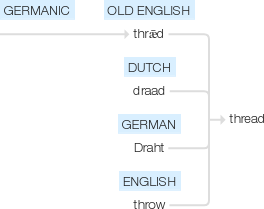Thread
Old English thrǣd (noun), of Germanic origin; related to Dutch draad and German Draht, also to the verb throw. The verb dates from late Middle English.
wiktionary
}}
From Middle English thred, þred, threed, from Old English þrǣd, from Proto-Germanic *þrēduz, from Proto-Indo-European*treh₁-tu-s, from *terh₁-(“rub, twist”). Cognates with Saterland Frisian Träid(“thread, wire”), West Frisian tried, Dutch draad, German Draht, Norwegian, Danish and Swedish tråd, and Icelandic þráður. Non-Germanic cognates include Albanian dredh(“twist, turn”). More at throw.
etymonline
thread (n.)
Old English þræd "fine cord, especially when twisted" (related to þrawan "to twist"), from Proto-Germanic *thredu- "twisted yarn" (source also of Old Saxon thrad, Old Frisian thred, Middle Dutch draet, Dutch draad, Old High German drat, German Draht, Old Norse þraðr), literally "twisted," from suffixed form of PIE root *tere- (1) "to rub, turn." Meaning "spiral ridge of a screw" is from 1670s. Threads, slang for "clothes" is 1926, American English.
The silk line, as spun by the worm, is about the 5000th part of an inch thick; but a spider's line is perhaps six times finer, or only the 30,000th part of an inch in diameter, insomuch, that a single pound of this attenuated substance might be sufficient to encompass our globe. [John Leslie, "Elements of Natural Philosophy," Edinburgh, 1823]
Nuts and bolts you know as little things that put big things together. Actually, our whole industrial civilization hangs by a thread—a screw thread. [Popular Science, March 1949]
thread (v.)
"to put thread through a needle," mid-14c., from thread (n.); in reference to film cameras from 1913. The dancing move called thread the needle is attested from 1844. Related: Threaded; threading.
